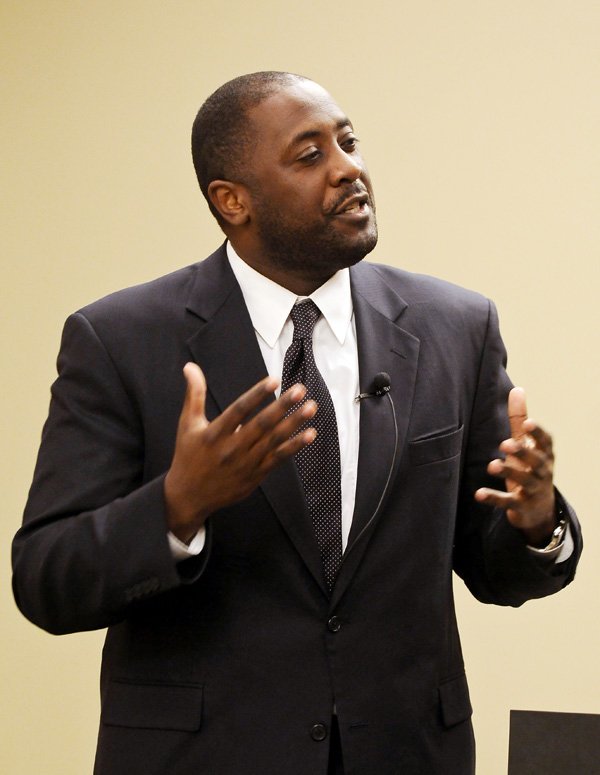BENTONVILLE — Equality is typically viewed as a fundamental American value, but in some ways it’s lacking in this nation, a University of Arkansas faculty member said Thursday.
“There is a gap between what we say and what’s going on here,” said Calvin White Jr., addressing a crowd of more than 100 at NorthWest Arkansas Community College on Thursday.
White, director of the university’s African and African-American Studies program, was invited to speak at the college’s annual Martin Luther King Jr. presentation.
Before launching into a speech touching on hot-button topics such as immigration, gay marriage and racism, White warned his audience they might not agree with him on everything.
“My job here is not to build consensus, but to give you something to think about,” said White, 40, a native of Stuttgart.
At A Glance
Calvin White Jr.
White’s research focuses on the extent to which class, respectability and the efforts of racial uplift intersected in the development of African-Americans’ religious traditions and racial identity after emancipation in the Arkansas and Mississippi Delta. His most recent book, “The Rise to Respectability: Race, Religion and the Church of God in Christ” was published by the University of Arkansas Press in 2012. He served as a Gilder-Lehrman fellow at the Schomburg Center for Research in Black Culture in Harlem, N.Y.
Source: University Of Arkansas
Jan. 15 was the 85th anniversary of King’s birth. He was assassinated in April 1968 while in Memphis, Tenn., while supporting sanitation workers who had gone on strike. Those were men who, despite working 40-hour weeks, still qualified for welfare, White said.
Despite having attained success in his own life — he earned a doctorate at 22 — King still spoke up for those he felt were not being treated fairly.
“He would take upon his shoulders the burden of fighting for those who couldn’t necessarily fight for themselves,” White said.
King was widely despised during the 1950s and ’60s because he was “sounding the trumpet of justice,” White said.
White compared the fight over civil rights then to the debates today over immigration and gay marriage.
It breaks his heart, he said, to see one of his students want to advance to graduate school, but be asked to pay out-of-state tuition because he's undocumented, even though he’s spent most of his life in America.
“We say, ‘Get an education, get an education.’ And yet we make it extremely difficult for some people to get it,” he said. “We got to work on the bridge between the rhetoric and what we do.”
White also talked about the importance of education, which he called “the great equalizer” because it gives everyone, regardless of their background, a chance to succeed. He learned firsthand as the son of blue-collar parents who didn’t go to college.
He also spoke glowingly of community colleges. He started his teaching career at Pulaski Technical College, a two-year school in North Little Rock, in 2000.
“I still tell people it was the best job I ever had,” he said. “There’s a special place in my heart for (community colleges). And many times I don’t think they get the credit they deserve.”
Jorge Vega was among the college students who attended White’s speech. Vega typed into his cellphone a quote from White he wanted to remember: “Our democracy will only be as perfect as its keepers, and we are the keepers of that democracy.”
“A lot of people complain about what this country is turning into, but we have a huge say in what this country is,” Vega said.
Vega thought it was a successful event. When he looked around the room, everyone seemed captivated by White’s speech, Vega said.
Cyndi Beltran, president of the Student Government Association, said she enjoyed the way White applied King’s dream of equality to today’s biggest issues.
Several people posed questions to White at the end of his speech, but nobody argued with him on any of his points.

